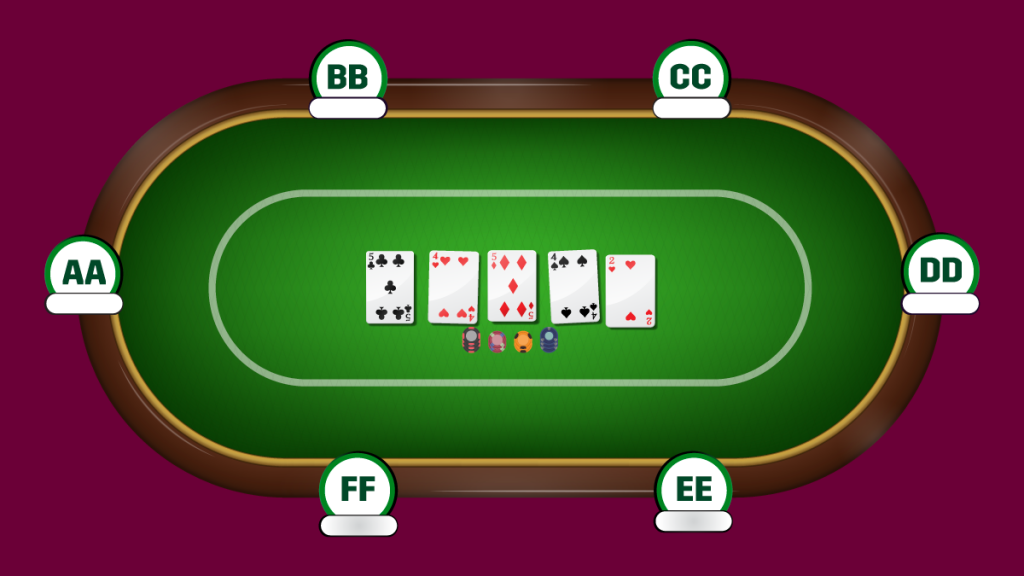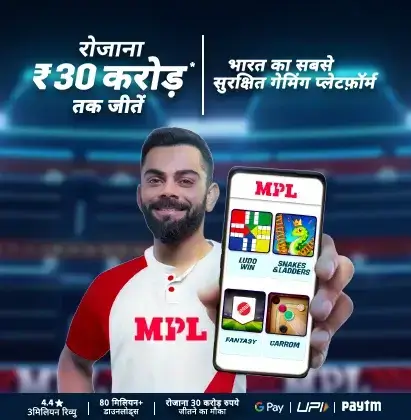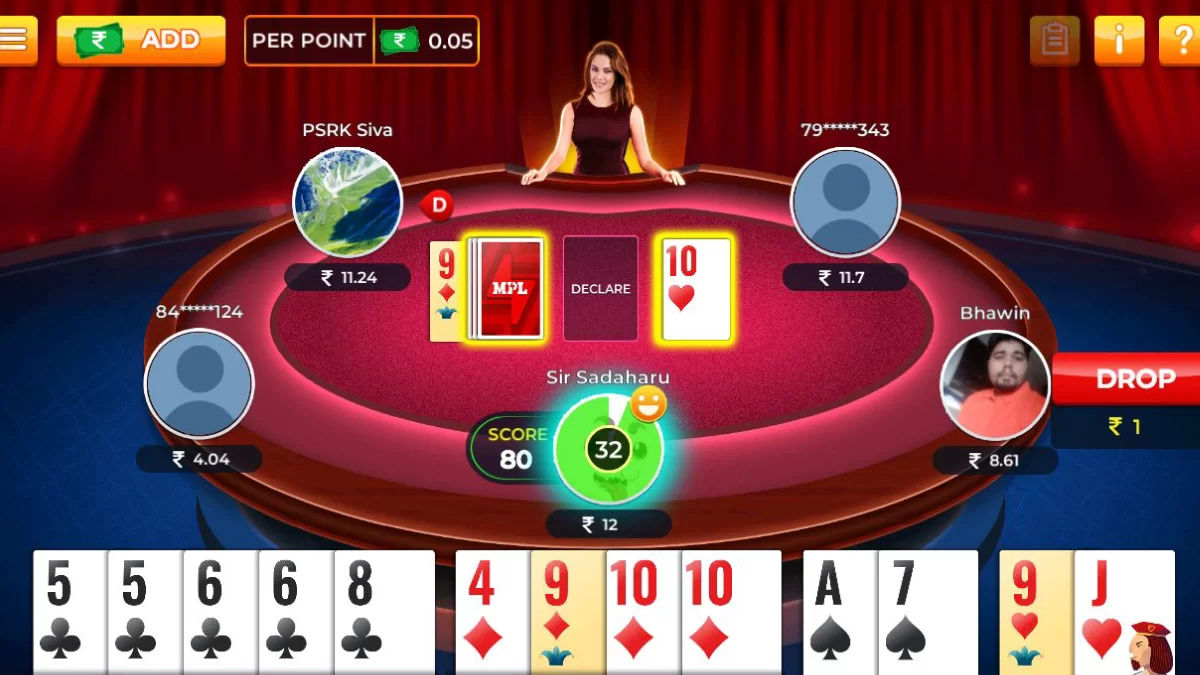Poker is a card game played with a deck of 52 cards. It is a game where players place bets based on other players player’s hands. There are a bunch of chips made of plastic that is equivalent to the money won while wagering. If you place a wrong bet, you will automatically lose money. The same poker tables made famous in films now have an online version. You can have a casino on your smartphone. On the MPL app, you can play Hold Em, the most popular type of poker game played worldwide.
Many will argue that winning a game at the poker table requires a fair amount of luck, but it is entirely untrue. To play Poker, to need to know a few strategies to turn the game in your favor. In this blog, we will address the most common poker mistakes while playing Poker. How do you ask?
There are a few mistakes that you can avoid as a beginner and turn into a pro in no time!

Types of Poker:
Poker is one of the most played and followed amongst online games in India. There are many variations of Poker that are played around the world, but Hold’Em and Omaha Poker remain the most well-known. On the MPL app, you will have an exceptional gaming experience while playing Poker. Whether you and your friends are beginner poker players or you are a thorough professional, MPL has all types of table limits for everyone.
NL Hold’em Poker (Texas Hold ‘Em)
On the MPL app, NL Hold ’em has gained attention for being the most popular Poker type. Commonly known around the world as Texas Hold ’em Poker. In this poker type, every player on the table is dealt with two cards privately (known as ‘Hole Cards’). The dealer spreads five cards on the table for common use, which all players can use to make their best possible five-card hand.
The player may or may not use the two private cards dealt with him at the start to form their five-card combination. The dealer spreads the cards over three turns – three at once (known as Flop), then another (known as turn), and then another (known as River).
PL Omaha Poker Game
Another version that has gained popularity in recent times is Omaha Poker. Called Pot Limit Omaha Poker, it has two fundamental differences from Texas Hold ’em.
- Unlike Hold ’em Poker, in PL Omaha, each player on the table is dealt four hole cards, while the five cards for common use remain the same. The player once again needs to make the best possible combination from the available nine cards at his disposal. However, in this poker variation, the player must use two hole cards and three community cards to make his best hand.
- The second difference is in the name: Pot-Limit. As the name suggests, a player’s bet is limited to the maximum amount in the pot during their turn.
Standard terms used in Poker
Various poker terms must be slightly confusing for a beginner. Here is a list of poker terms that you should know as a poker beginner:
Blind: Blinds are forced bets posted by players to the left of the dealer button in flop-style poker games. The number of blinds is usually two, but it can range from none to three.
Pocket pair: When you get two cards of the same ranking, such as 2-2 or A-A, you are dealt a pocket pair
Small Blind: A small blind is made by the player sitting to the dealer’s left to kickstart the plot. It is usually half of the big blind.
Big Blind: Made by the player sitting to the left of the one who made the small blind. The big blind is equal to the minimum bet. Once the big blind is made, the rest of the players proceed towards the first betting round clockwise.
Pre-Flop: The first betting round, where players take action without any of the community cards revealed.
Flop: Three community cards are revealed. The players then proceed to make bets.
Turn: The fourth community card is revealed, followed by which players make bets.
River: The final community card is revealed. The remaining players on the table make their bets.
Showdown: Players reveal their respective hands. The best hand wins the pot.
Check: Passing the action without betting anything in the pot. The player can only do the check if they have made a bet before your turn.
Bet: If no opponent has made a bet until the player’s turn, the player can choose to bet. Once a bet has been made, the rest of the players will have to either ‘call’ on the bet or ‘raise’ it to continue playing.
Call: Matching the bet made by the opponent.
Raise: Raising the bet during that betting round. The player must first ‘call’ on the bet before putting some additional chips in the pot to raise.
Fold: Forfeiting the game during the player’s turn. The player will be ineligible to participate in subsequent rounds.
Beginner mistakes in Poker
There are some standard tips in poker that you must know while playing. However, whether you are playing online or offline, here is a list of some common beginner mistakes made in Poker:
1. Not Taking the initiative
Many beginners do not like being the person in control of the hand. In other words, if you do not become the raiser, you might be one of those limping into the pot. Limping for you should be a very, very rare case, which beginners often fail to do. The aggressor or the raiser can be very powerful because they can win more pots. Many a time, poker players will have has a weak draw. So the person who has taken control of the pot pre-flop will often win the pot by simply continuing to exert their aggression after the Flop.

2. Not Playing Enough Hands
Another primary blunder beginners make in Poker is not playing enough hands before concluding. They get hung up on individual indicators, bad beats, etc. Avoid making the mistake of playing too tight by widening your pre-flop ranges and achieving a good balance between value hands and bluffs. If you’re hard to predict – mixing good hands and effective bluffs – you’ll be a challenging opponent to beat.
Poker is a card game where a short-term luck factor is involved. On the flip side, however, it also requires the right strategies to win and apply them to see the results. Hence, it is advisable to play as many hands as possible.
3. Not Having the Correct Bankroll Budget
Especially for beginners, it is very critical to have a particular budget assigned before jumping into the play. Bankroll management is as vital as learning to play Poker; otherwise, you’ll end up losing all the money. Keep aside a specific amount of money only for Poker.

4. Playing too many hands
Contrary to playing with too few hands, playing too many hands can also be a problem. Playing every hand shows that you are not willing to fold when you have a weak hand.
Knowing how and when to fold is a skill that a beginner needs to master to become a successful poker player. By being more demanding and decisive, you’ll not just improve your win but also make your post-flop decision easier.
5. Bad Bet Sizing
A mistake beginner poker players make is using bet sizing strategies meant for a much higher limit at the micros. Many beginners use slowplay these days after the Flop, where they are simply losing value against a very basic opponent who would have paid them off for much more.
6. Tilting all the winnings
Beginners tend to lose patience and give all their winnings away when they make a terrible wager. It’s all good when they are making a profit, and then after a few repeated bad bets, they lose their patience and give all their money away in a desperate attempt to win. Many beginners ruin their poker careers in this way. You cannot allow your emotions to get ahead of you. Sometimes, an inexperienced player might get lucky and win the game. This is a part of Poker, and you need to accept it because it is a part of the game.

7. Using the same strategy all the time
Players use different techniques when it comes to Poker. Some players rely on the bluff. Some players play too many hands, and others play too tight. Some players only focus on playing the odds. The obvious picture is, we need to win.
A mistake commonly made by beginners is finding a single playing style that they like and then using it all the time. For example, a player may enjoy playing hands in a certain way and always play in the same manner. Sticking to a single style of play is a problem for two reasons:
- It would help if you were fluid in your playing style to be successful. Different strategies will be effective in other circumstances – and with different opponents.
- To avoid predictability, do not use the same strategy over and over again. Keep switching methods because the players are watching you, online or offline.
8. Giving Too Much Value to The Strength Of Ace Rag Hands (Weak Aces)
Little aces such as A6 and A2 are known as Ace rags. Often, beginner poker players see an ace in the hole and think the hand is much stronger than it is. Weak aces are dominated quite often by other opponents’ more potent aces. This means that you will either lose a big pot or win a small one. There is a time and place to play weak aces.
9. Fancy Play Syndrome
In the game of Poker (texas hold’em or otherwise), the way to win is to make one good decision after another. Beginners often bet all their weak hands and check and call strong hands. This is not always beneficial. If you think a hand is strong, your best path forward is to make a value bet. A final mistake I see on the table is players not obeying Poker the unwritten rules of Poker.
10. Stop Chasing Flush Draws
When calling with a draw (for example, a flush draw with A♥K♥ on a 9♥5♠2♥) you must have the correct pot odds and equity to call. The pot odds depend on your opponent’s bet size and the size of the pot, whereas your equity depends on how many outs your draw has.
For the A♥K♥ example above, you have nine hearts (Q♥ J♥ T♥ 8♥ 7♥ 6♥ 5♥ 4♥ 3♥) to make a flush draw which in all cases but the 5♥ (due to the whole house possibility) will give you a flush draw and best hand possible (called the nuts).
You can also win with any Ace (A♦, A♠, A♣) or King (K♦, K♠, K♣) which gives a total of 8 hands to the nuts and a further 5 to what is likely the best hand – this whole process is called counting outs.
So this is an easy call against most bet sizes due to the number of outs we have and the strength of each of these outs.

In Conclusion
Poker is a game that requires years to get a grip of. You can use these strategies as a beginner when starting, but it is always practice and experience that come in handy to become a thorough professional. You can develop newer strategies when playing such cash games. Remember always to enjoy it!










